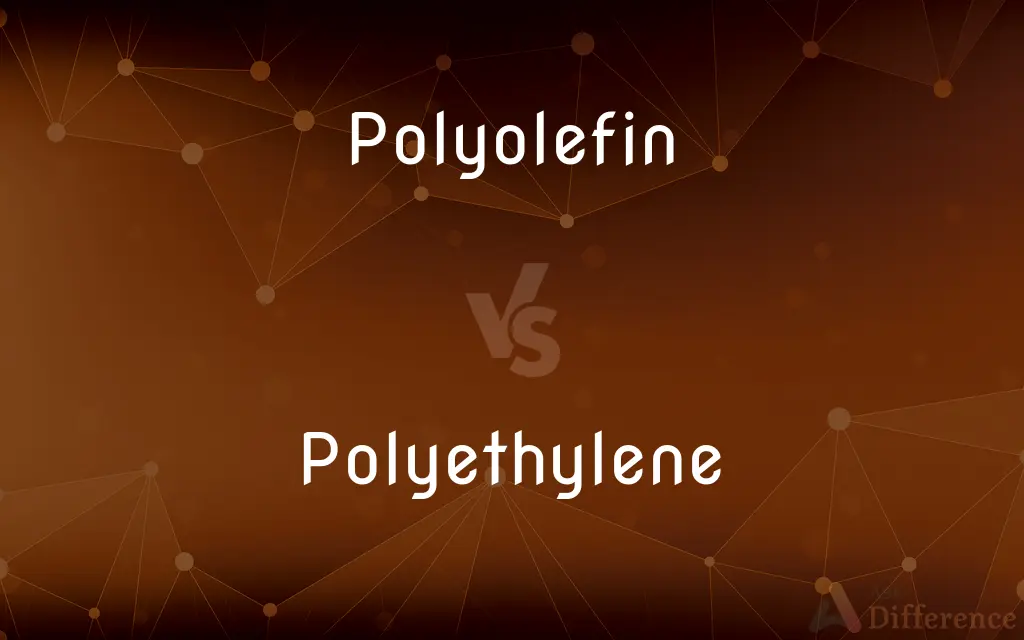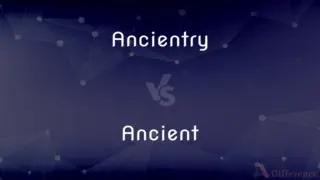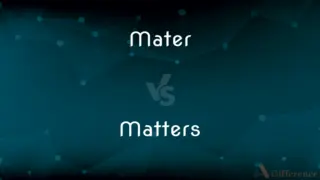Polyolefin vs. Polyethylene — What's the Difference?
Edited by Tayyaba Rehman — By Fiza Rafique — Updated on October 24, 2023
Polyolefin is a family of polymers made from small olefins, while polyethylene is a specific type of polyolefin derived from ethylene.

Difference Between Polyolefin and Polyethylene
Table of Contents
ADVERTISEMENT
Key Differences
Polyolefin and polyethylene are terms in the realm of polymers and plastics, each signifying specific types of materials. Polyolefin represents a broad category of polymers produced from olefin monomers, which are hydrocarbons with a double bond. Polyethylene, on the other hand, is a particular member of the polyolefin family, synthesized from the monomer ethylene.
While polyolefins encompass a range of polymers, including polypropylene, polybutene, and others, polyethylene stands out as the most commercially significant and widely used member. Its ubiquity is attributed to its versatility and properties that make it useful in applications ranging from packaging to automotive components.
It's important to understand that while all polyethylenes are polyolefins, not all polyolefins are polyethylenes. This distinction is analogous to how all squares are rectangles, but not all rectangles are squares. Polyolefin is the broader category, while polyethylene is a specific member of this category.
The properties of polyolefins can vary greatly, depending on the type of olefin they're derived from and the polymerization process used. Polyethylene, being a specific type, has properties that can be broadly categorized, although it too has variations such as low-density polyethylene (LDPE) and high-density polyethylene (HDPE), each with its unique set of characteristics.
In summation, while polyolefin encompasses a wide range of polymers with varied applications and characteristics, polyethylene is a specific, highly prevalent type within this family, with its distinct properties and uses.
ADVERTISEMENT
Comparison Chart
Definition
A polymer derived from olefins
A specific type of polyolefin derived from ethylene
Examples
Includes polypropylene, polybutene, etc.
Includes LDPE, HDPE
Commercial significance
Varies depending on type
Most widely used polyolefin
Source Monomer
Derived from various olefins
Derived specifically from ethylene
Versatility
Broad range of properties and applications
Specific set of properties and common uses
Compare with Definitions
Polyolefin
A polymer produced from an olefin monomer.
The product is made from a durable polyolefin.
Polyethylene
A plastic with applications from films to containers.
This polyethylene film protects the product from moisture.
Polyolefin
A type of plastic derived from hydrocarbons.
The container is constructed from a tough polyolefin.
Polyethylene
A polymer with high chemical resistance and electrical insulation properties.
Polyethylene pipes are used for their resistance to corrosion.
Polyolefin
A category of thermoplastic polymers.
Polyolefin materials are resistant to chemical reactions.
Polyethylene
A member of the polyolefin family, with varieties like LDPE and HDPE.
High-density polyethylene (HDPE) is tougher and more rigid.
Polyolefin
A family of materials that includes polypropylene and polyethylene.
For this application, either polyolefin type will work.
Polyethylene
A lightweight thermoplastic derived from ethylene.
The bottle is made of flexible polyethylene.
Polyolefin
A polymer used in various applications from packaging to automotive.
The automotive industry uses polyolefin for many interior components.
Polyethylene
A common type of plastic used in packaging.
Polyethylene bags are commonly used in supermarkets.
Polyolefin
A polyolefin is a type of polymer with the general formula (CH2CHR)n. They are derived from a handful of simple olefins (alkenes).
Polyethylene
Polyethylene or polythene (abbreviated PE; IUPAC name polyethene or poly(methylene)) is the most common plastic in use today. It is a polymer, primarily used for packaging (plastic bags, plastic films, geomembranes and containers including bottles, etc.).
Polyolefin
(chemistry) A polymer (such as polyethylene) made by the polymerization of an olefin
Polyethylene
A polymerized thermoplastic ethylene resin, used especially for containers, kitchenware, and tubing, or in the form of films and sheets for packaging.
Polyolefin
(chemistry) A polyene
Polyethylene
(organic compound) A polymer consisting of many ethylene monomers bonded together; used for kitchenware, containers etc.
Polyethylene
A lightweight thermoplastic; used especially in packaging and insulation
Common Curiosities
Why are polyolefins used in packaging?
Polyolefins, especially polyethylene, are durable, resistant to chemicals and used in packaging.
Are polyolefins only made from ethylene?
No, polyolefins can be made from various olefins, whereas polyethylene is specifically from ethylene.
Can I use polyethylene and polyolefin interchangeably in all contexts?
No, while all polyethylenes are polyolefins, not all polyolefins are polyethylenes.
Which is more commonly used, polyolefin or polyethylene?
Polyethylene is the most commonly used polyolefin.
What is LDPE and HDPE?
LDPE is low-density polyethylene, and HDPE is high-density polyethylene, both types of polyethylene.
Share Your Discovery

Previous Comparison
Ancientry vs. Ancient
Next Comparison
Mater vs. MattersAuthor Spotlight
Written by
Fiza RafiqueFiza Rafique is a skilled content writer at AskDifference.com, where she meticulously refines and enhances written pieces. Drawing from her vast editorial expertise, Fiza ensures clarity, accuracy, and precision in every article. Passionate about language, she continually seeks to elevate the quality of content for readers worldwide.
Edited by
Tayyaba RehmanTayyaba Rehman is a distinguished writer, currently serving as a primary contributor to askdifference.com. As a researcher in semantics and etymology, Tayyaba's passion for the complexity of languages and their distinctions has found a perfect home on the platform. Tayyaba delves into the intricacies of language, distinguishing between commonly confused words and phrases, thereby providing clarity for readers worldwide.















































